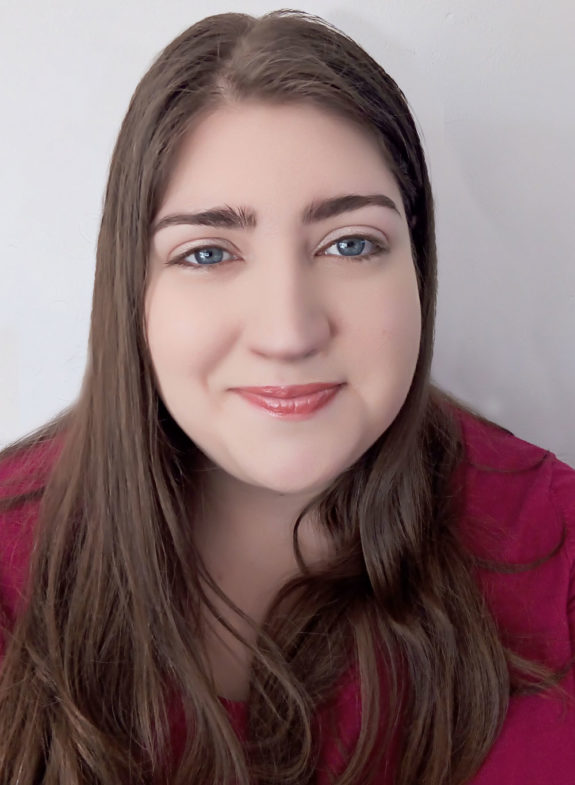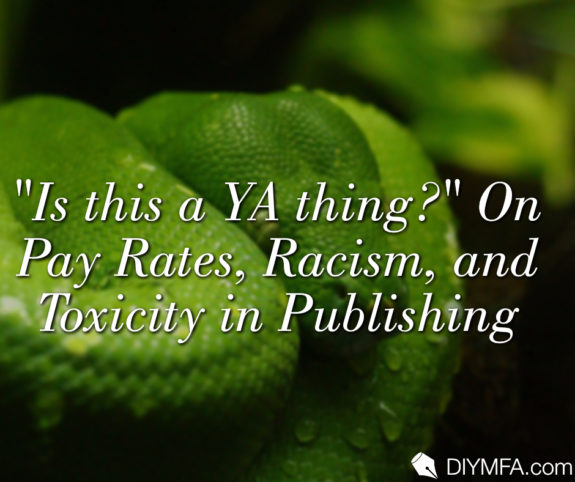Since my last column a lot has shifted. In the US massive protests are demanding justice for Black people who have been killed by police, and the calls for justice are rippling outward to related issues. Racism is a factor in the publishing industry as well, and now is the time to talk about it.
Author L.L. McKinney started #PublishingPaidMe, encouraging traditionally published writers to share their advances. Immediately it became clear that what was rumored is based in fact: Traditional publishing underpays Black authors, by a lot. Even as alarming disparities rolled in (Multi-Hugo award-winner NK Jemison received only $75k for her Broken Earth trilogy–the series that netted 3 Hugos in 3 consecutive years–while multiple white debut authors reported advances nearing $1 million.), the hashtag was almost immediately misconstrued.
“Is this a YA thing?” some asked.
If you’ve not closely followed the discourse within the YA publishing community at all in the last 5-10 years, you might well ask that question. Much of these conversations take place on Twitter, among authors, agents, editors, and readers, and may commonly be called “YA Twitter.” There have been some major scandals discussed within YA Twitter, large enough that news orgs and blogs have reported on them. That reporting almost always characterizes the conversations as “toxic” and claims that “cancel culture” is rampant.
To the casual observer, #PublishingPaidMe could very well look like ‘yet another YA Twitter blow-up.’ The hashtag was started by a YA author, after all, and many of the first posts came from YA authors. YA Twitter has a reputation by now. Surely this is more of the same.
To answer the question, this is not only a YA thing. This is a publishing thing. What starts in YA and kidlit has significance for the rest of publishing, and ignoring or dismissing it is both insulting and foolish.
Today let’s examine a brief history of what YA Twitter actually talks about and how, why it’s been mischaracterized repeatedly, and who benefits from that.
What’s been happening on YA Twitter?
Twitter is a popular place for discussions concerning publishing, and it can be a great resource for writers who want to stay on top of changes in the industry. There are spaces for different genres, and age categories, traditional publishing, and self-publishing, and so on. YA Twitter is just one of many spaces.
What makes YA Twitter different? A few things.
- Traditional YA publishing has become more open to diverse storytelling and authors. Rates of diversity in kidlit are broadly more encouraging (though by NO means good) in books for kids than they are in many adult genres. Orgs like We Need Diverse Books have done tremendous work to keep this top-of-mind.
- There’s more space in YA for authors who break the predominant Christian straight cis white mold, and consequently more participants who do not fit that mold. They may be BIPOC, LGBTQIA+, disabled, neurodivergent, from a variety of religious backgrounds, and so on.
- The stakes are higher in YA, and all of kidlit, because the readers are young and vulnerable. While adult readers have more coping mechanisms for grappling with harmful content, kids have far fewer and may be profoundly wounded by what they read, in a way that will stay with them for a lifetime.
- Consequently, you have more participants, more authors from diverse backgrounds, who want to ensure books are doing right by their young readers. And they speak up.
When a marginalized YA author comes across a book that is problematic or outright harmful they weigh their options.
- They can stay silent, in which case nothing changes and a damaging book is released into the world.
- They can try to address the matter privately, such as giving feedback on an arc directly to the publisher, and hope something changes before publication. Their feedback is frequently ignored, and a harmful book is released into the world.
- They can say something publicly. PROS: There may be a groundswell of support that pushes the publisher to make changes, harmful content isn’t swept under the rug, and hopefully the hurtful draft never makes it into the hands of young readers. CONS: The author who speaks up opens themselves up to a deluge of criticism, harassment, and threats, which could include a campaign against their books.
Choosing #3 is by no means easy. Authors do it because they are sick of seeing harmful content put into the world. They do it because they are tired of kids getting hurt by books, which are supposed to bring them comfort. They do it because if they don’t it’s highly unlikely anyone else will be brave enough to.
So, when YA Twitter talks about these issues, it’s coming from a place of wanting to fix what’s wrong and make a better environment for everyone.
Why is YA Twitter called toxic?
No one likes to be told they’ve made a mistake. And people with privilege often react badly to being told that they have privilege, let alone how they’ve made a mistake stemming from that privilege. The publishing industry is steeped in privilege. The privilege of resources that afford one the ability to write and complete a book, the privilege of agents and editors who “love” a book enough to champion it, the privilege of being able to afford three unpaid internships before landing a paid position making $30,000 in Manhattan.
Not only is it difficult for the industry to hear and accept that it’s making mistakes, fixing those mistakes costs money. They would have to pay their employees better, pay authors more, pay for adequate fact-checking and sensitivity readers, hire new people to broaden their teams. Change is expensive.
How to avoid having to acknowledge problems and make costly changes? Act as though the complaints are invalid. Paint the people speaking out as acting in bad faith. Claim they want to “cancel” and banish people who make mistakes (pro tip: it’s far more likely that the person who spoke up will be blackballed and driven from the industry). Call them toxic, and not worth listening to. A sideshow to be stared at from a safe distance and not taken seriously.
Who benefits from the toxicity narrative?
Journalists, news outlets, and blogs: The headlines are often clickbait, and result in ad revenue. Fomenting discord results in money for the outlets.
Publishing houses: People have predicted the death of publishing for years, sometimes even from inside publishing. It’s a common claim that there simply isn’t money to pay employees better, or to pay advances to (particularly marginalized) authors… and yet executives take home millions in compensation every year, and there’s always money for splashy book deals.
The status quo: The argument that this discourse is inherently toxic invalidates the very real concerns being raised, and provides an excuse for traditional publishing not to act on them. Agents, editors, and other publishing professionals can pretend the people raising concerns aren’t worth listening to, and keep doing their jobs exactly as they always have. They don’t have to expend their time or money creating change.
Systems of oppression: When publishing doesn’t work to dismantle the status quo, the status quo is upheld and continues to perpetuate embedded white supremacy, racism, and other forms of bigotry and oppression. We know these things are there because we see their impact repeatedly, from who gets to be a protagonist to who is employed to produce the books. Producing books that are products of these systems help to reinforce them, and so it continues.
Who loses out when YA Twitter is called toxic?
Readers: Delivering harmful books hurts the kids who are targeted, and the kids who aren’t directly impacted.
Aspiring writers: Writers who hope to publish are turned away from valuable information and education, making them more vulnerable to scams, schmagents, and other risks.
Marginalized authors: As demonstrated by #PublishingPaidMe, marginalized authors, especially Black authors, are paid far less. When one concern from marginalized folks is ridiculed and dismissed (ie., that some content is harmful), it weakens their position in other areas. Why pay them more if they’re going to ‘stir up trouble’? Why pay them more if they’re ‘oversensitive’? Why take on their books at all? It’s infantilizing and infuriating.
The world at large: Publishing does not exist in a vacuum. Publishing influences what people think, and how they behave. If the books coming out of publishing houses are damaging then that damage will ripple outward. Oppressive systems in other areas will strengthen, and continue. More people will be hurt. Social change can be hugely influenced by the content we consume.
It’s not just a YA thing, and YA can’t fix it alone
Calling discussion of systemic issues in publishing overblown or toxic discredits the discussion and the people taking part. It is a deliberate tactic employed by people who do not want to risk change.
These conversations need to happen. Silence allows abusive practices to continue. #PublishingPaidMe was started to break that silence. There are still lots of taboo subjects in publishing discourse, but hopefully who gets paid what will no longer be as secretive.
The YA space has so many brave, dedicated champions within it. Instead of dismissing them, listen to them. Buy their books. Pay them. Learn from them, and hold all of publishing accountable.

Bronwen Fleetwood writes fiction for young adults, and nonfiction for writers. Bronwen studied creative writing at Eugene Lang, The New School for Liberal Arts, has acted as leader of the Princeton Writing Group, and as a Municipal Liaison for National Novel Writing Month. Bronwen currently lives on the Whale Coast of South Africa, between the mountains, the sea, and a lake. You can connect with her at bronwenfleetwood.com.







